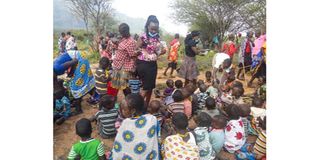NGOs step up war on harmful traditions in West Pokot

Ms Teresa Cheptoo, World Vision project officer for the Girl Child Promotion Project, helps children in West Pokot. Non-governmental organisations in West Pokot have declared war on female genital mutilation, early forced marriages and other harmful traditions.
What you need to know:
- They have declared war on female genital mutilation and early forced marriage and want all girls to remain in school; move follows a surge in gender-based violence, including rape and defilement.
- Irep Foundation and World Vision Kenya have revealed that more than 100 girls underwent FGM after schools were closed for the December-January holidays and many others married off, thus failing to resume learning.
Non-governmental organisations in West Pokot have declared war on female genital mutilation (FGM), early forced marriages and other harmful traditions, targeting perpetrators and parents.
The move follows a surge in gender-based violence, including rape and defilement. Irep Foundation and World Vision Kenya have raised the red flag, revealing that more than 100 girls underwent FGM after schools were closed for the December-January holidays and many others married off, thus failing to resume learning.
World Vision child protection officer Teresa Cheptoo has called for an immediate stop to the outdated practices. “It will not be business as usual for the organisers of female circumcision. They should know that their days are numbered. We shall be on your neck. Young girls are being defiled, yet they should be given time to be in school. The vices are perpetrated by relatives,” she says.
She emphasises the need to incorporate young men in the fight and prioritise education to help protect girls. “Boys have been sidelined, yet they are the perpetrators. Being included in the fight against the vice won’t make you a lesser man. Men are the ones who rape, defile, marry and make girls undergo the cut,” says Ms Cheptoo in the Konyao area, warning parents who abet FGM and early forced marriages that they will face the law.
Hard times
Irep Foundation director Domitilla Chesang attributes the surge in cases to the high cost of living, hunger and hard economic times that prompt many residents to turn to bride price as a source of income. “The extreme effects of climate change include drought, which has forced communities to resort to extreme measures for survival, that is marrying off girls.”
West Pokot borders Uganda, hence an increase in cross-border FGM. Its pastoralist families move in search of water and pasture to keep their livestock alive. As a result, the organisations say, many children drop out of school.
Citing a survey, Ms Chesang says Lomut ward is leading in FGM, followed by Masol, Seker and Alale respectively. “Young girls are taken out of school, subjected to FGM to salvage their families from starvation and insecurity. Cows are killed and others stolen. Currently, many families are unstable and girls are the ‘solution’ to their suffering. They are married off to men who are stable.”
She explains that during hard times, women and girls are more vulnerable as they face socioeconomic and political barriers that limit their coping capacity. “In the absence of strong mitigation measures, adolescent girls are at greater risk of harmful practices. Girls can also be married off for a bride price to help a family survive the drought. To do that, they have to first undergo FGM.”
Preserved for early marriage
Ms Chesang notes a trend where young girls are “chosen and set aside” to save their families from problems like starvation and so they are not allowed to join school. “The first- and second-born are always married off. They know they are beautiful, hence cut and married off to fetch many [head of] cattle.”
“When drought occurs, it is women and girls who are most affected as they have to queue day and night to pump water,” she says.
“We had not realised mass cutting of girls for a long time because of sensitisation and work done by different partners. In this community, FGM is a requisite of early child marriage.”
World Vision’s David Krop, an anti-FGM project officer in Alale, notes that nomadic life is on the rise. “This is due to the water challenge. Girls search for water for livestock where they walk for many kilometres to access. Parents decide that girls drop out of school and stay at home to look for water. While in the grazing fields, they mingle with warriors, who elope with them.
“Animals are dying and people dispose of them as [reverse] dowries to get wives so that the cattle don’t die in their possession,” Mr Krop says.
He adds that World Vision is registering schoolgirls as it intensifies war on the practices. “We visit schools to confirm with teachers and progress on enrolment. We sensitise parents that they should not take children to school only during rainy seasons and fail during drought,” he said.





